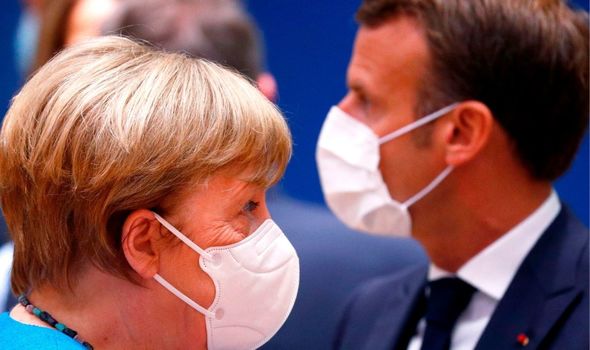Smaller member states said they were already missing the UK’s influence in Brussels amid signs that Angela Merkel and Emmanuel Macron plan to waste no time in imposing their dominance over the bloc. Angry officials said Ms Merkel had showed she was willing to flexing her muscles in Britain’s absence by pushing through a trade deal with China before Germany’s six-month presidency of the EU comes to an end.
Brussels and Beijing have struck an investment deal which the German chancellor insists will give European companies greater access to Chinese markets and help redress unbalanced economic ties.
But the treaty is already threatening to spark a rift across the EU just days after Britain finally left the bloc’s orbit.
One Brussels diplomat told politico.eu: “There’s a lot of frustration among smaller countries about the way the Commission has been used to push through one of Merkel’s pet projects at the end of her term and the end of her legacy.
“Is this the way the EU will work post-Brexit?
“The Brits are just out and we’re already missing their open market-oriented approach.
“If Germany weighs in too much, smaller EU countries have nothing to say.”
The China agreement was negotiated for nearly seven years and is likely to take at least another year to enter into force.
It forms part of a new relationship with China which Ms Merkel views as both a partner and rival.
The agreement was sealed after China’s President Xi Jinping held a video call with Ms Merkel, Mr Macron, European Council President Charles Michel and European Commission President Ursula von der Leyen.
But officials from Italy, Poland, Belgium and Spain have criticised the way Germany pushed through the agreement despite their warnings it ignored slave labour concerns in China and risked alienating incoming US President Joe Biden.
The officials said they felt steamrolled by Ms Merkel and the “German engine” inside the European Commission, in particular, Ms von der Leyen and trade department director Sabine Weyand, who are both German.
Under the deal, European firms will gain permission to operate in China in electric cars, telecom cloud services and certain activities linked to air and maritime transport, such as ground handling.
Joint venture requirements will fall away for the automotive sector, many financial services, private hospitals, advertising, real estate and environmental services, such as sewage.
Companies that could benefit include Germany’s Daimler, BMW, Allianz and Siemens and France’s Peugeot which all have a major presence in China.
Ms von der Leyen called the agreement an important landmark in the EU’s relationship with China.
Mr Macron said relations between the EU and China had strengthened in recent years and would continue to do so.
The French President has offered to accompany Ms Merkel on a visit to China in the coming months to discuss further areas of cooperation.
Critics of the deal fear it hands a political win to President Xi whose government has been under fire for its brutal crackdown on democracy in Hong Kong, its treatment of ethnic minorities in Xinjiang and its reaction to the coronavirus pandemic.
Italian foreign affairs minister Ivan Scalfarotto told the Corriere della Sera: “We are giving a positive signal to China at a time of significant human-rights concerns.”
German officials insist they and the Commission consulted with other capitals and that while some raised objections no one held up a “stop sign”.






